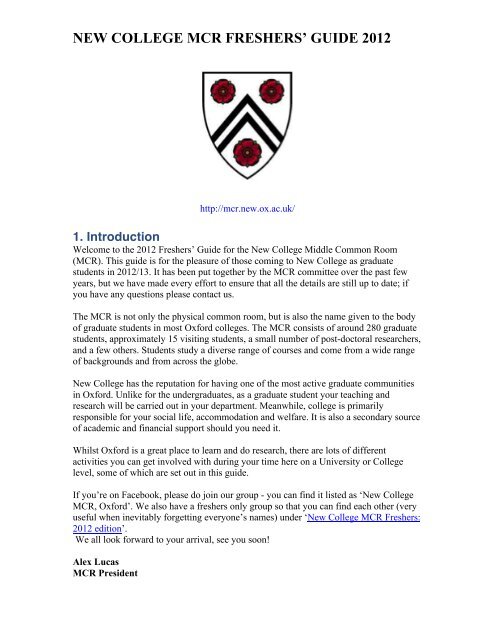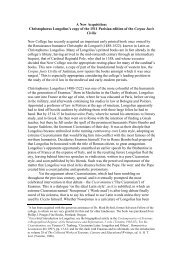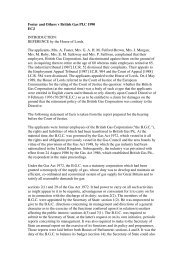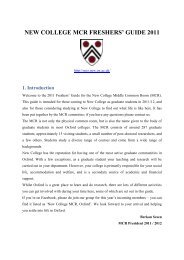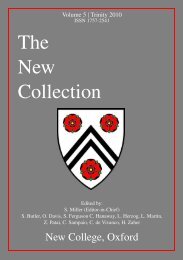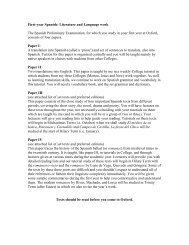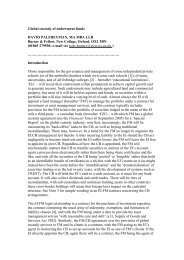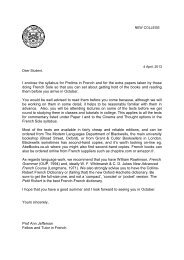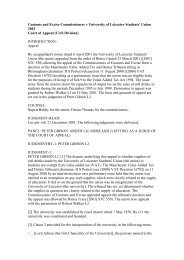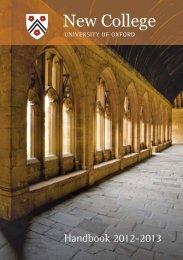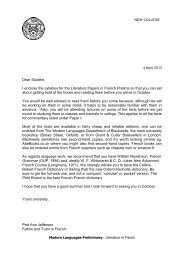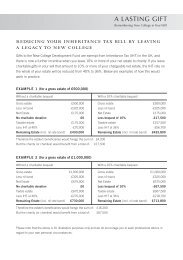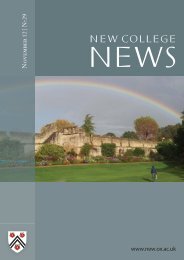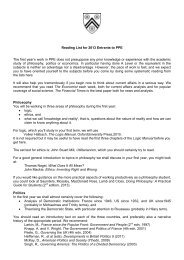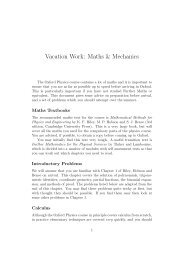You also want an ePaper? Increase the reach of your titles
YUMPU automatically turns print PDFs into web optimized ePapers that Google loves.
typically a college fellow who works in the subject area of their advisee, but who is nottheir advisee's main supervisor. Your advisor is supposed to be your port-of-call if youhave any academic difficulties on which you would like an independent opinion.Your advisor should contact you during your first term. They will do so via your Oxfordemail address, so it is imperative that you set this up ASAP following arrival. Thepurpose of this contact is purely to touch base and ensure your transition to Oxford isproceeding smoothly. You are also encouraged to make contact with them. If you haveany problems with your adviser please contact either the <strong>MCR</strong> President or the Tutor forGraduates.BursarThe Bursar, David Palfreyman, is responsible for the college's finances. If you have anyunforeseeable financial difficulties he may be able to help you. Contact him through hissecretary, Kate Hunter.Home BursarThe Home Bursar, Caroline Thomas, is responsible for the domestic side of college life,including accommodation, college staff, and food. She is also part of the welfare team.Contact her either by e-mail or in the Home Bursary in 4OB.DeanThe Dean, Dr Michael Burden, is responsible for discipline in college. Day-to-dayrunning of this side is carried out by the Assistant Dean and three Junior Deans. If youwant to hold an event in college, you have to apply to the Assistant Dean for permission.Hopefully, this is the only time you will have to see the decanal team!IT OfficerJames Dore is the college's IT Officer. His team is responsible for the computer provisionin college. They are available to deal with any computer related issues you may have.They have an office in the Garden Quad.Welfare Fellows (Cox and Salvesen Fellows)College employs two Junior Research Fellows who also have a welfare role; they arecalled the Cox and Salvesen Fellows. They are currently Hilary and Martin Mickup,respectively.PortersThe Porters live in the lodge in the Holywell Quad (there is also a lodge at the sportsground) and are the first port of call for all everyday issues in college, e.g. lost keys, lightbulbs, etc. The Porters work long hours and deal with all the various and quirky needs ofcollege members. Please be polite and friendly when dealing with staff at either lodge.4. Facilities4.1 New CollegeThe <strong>MCR</strong> – The Rew Nooner SpoomThis is your common room - the actual <strong>MCR</strong>. It was named after the Rev. Spooner,sometime Warden of New College who was famous for his verbal gags or `Spoonerisms':hence the name. The <strong>MCR</strong> is commonly called `the Spoom'. It is open 24 hours a day andhas a 42" television, DVD player, Nintendo Wii, PS3, board games, books, coffeemachine, wi-fi, and newspapers and other publications. It also has a bar area which isopened regularly- especially on Wednesday nights- and used for other purposes includinga weekly brunch.As of 2009, the Spoom has a new location in the Weston Sports Pavilion. Refurbished5
over the 2009 summer vacation, the Rew Nooner Spoom (New Spooner Room) isundoubtedly one of the most comfortable and inviting <strong>MCR</strong>s in Oxford. The facilities aresplit across the main living room area upstairs and the television and computer roomdownstairs. Access to these rooms and indeed the Sports Pavilion is via Fob, which willbe distributed to you during 0th week. If you are confronted with any fob-malfunctionissues, contact either Alex Lucas (alex.lucas@new.ox.ac.uk), or the deputy clerk ofworks, Chris Conway (chris.conway@new.ox.ac.uk).The bar in the Rew Nooner SpoomThe JCRGraduate students are also members of the Junior Common Room (primarily theundergraduate body of college). The physical JCR is located in the Garden Quad and hasa satellite television, pool table, etc.Hall‘Hall’ refers to the dining hall in college. The Hall is located in the oldest part of collegewith the buttery next to it. Food is available to graduates during term time; all meals arecharged to your till account and paid for using your Bod Card (see below). This year, thekitchen, hall, and JCR bar will be undergoing refurbishments during Trinity term.Temporary hall and kitchens will be set up in the Holywell Quad.Breakfast: Breakfast is available from 8am to 9am on weekdays and 11am to 1pm atweekends. A choice of an ‘English’ cooked breakfast, ‘continental’ breakfast, cereal etc.is available and charged per item.Lunch: Lunch is available 12 to 1.30 on weekdays. As with breakfast, it is served a lacarte and typically costs around £3.Dinner: There are two sittings for dinner. The first sitting is from 5.30 to 6.30 everyevening apart from Sunday. This is known as ‘informal hall’.For the later sitting, ‘formal hall’, you must be seated for 7.15 when the Fellows come in.6
You should stand up when the Fellows come in and sit down after they have said grace.Unusually for Oxford, we do not stand up when the Fellows leave at the end of dinner.You must wear your gown, but this may be worn over casual clothing. Whilst informalhall is buffet style, formal hall consists of a three course meal with waiter service.To dine in the evening, you must sign-up before 10am on the morning of the dinner usingthe food website: food.new.ox.ac.uk.There are occasionally other dinners, in particular guest dinners, which are heldfortnightly on odd-numbered term weeks. These guest dinners are a great favorite of the<strong>MCR</strong> for their lavish 3-course catering and the customary afterparties. <strong>MCR</strong> membersmay bring up to 4 guests.Dining on high table: Fresher graduates may dine at high table once during their first yearwith the Tutor for Graduates. This will be advertised during term. You could also try andpersuade your college adviser to invite you to dine at high table.College BarThe college bar, beer cellar, or JCR bar, is primarily student run. It is open from 6pm to11pm during term, and often out of term as well. The bar is located under the hall and isaccessedfrom a narrow passage behind the Garden Quad. There is a pool table, table football anddartboard.Drinks are cheap (considerably cheaper than in town) and all the profits are split betweenthe JCR and <strong>MCR</strong>. You can pay cash but it is slightly cheaper to use your Bod card andcharge it to your till account.Sports facilitiesNew College has one of the best and most beautiful sports grounds in Oxford, located afive- minute walk from college on St. Cross Road. This has football and rugby pitches,cricket square and (new) nets, one hard tennis court and six grass courts. There is asquash court and table-tennis table in the pavilion. Most of these can be booked at theWeston lodge.College has sports teams in a wide range of sports: details will be available duringfreshers' fortnight. The <strong>MCR</strong> also has its own football team. The collegiate nature of theuniversity makes it very easy to get involved in sport whilst at Oxford.Rowing is, of course, big in Oxford. College has a boathouse on the Isis and a very activeboat club. There will be several novice boats run during Michaelmas, as well asopportunities for experienced rowers. Again, these will be advertised in freshers'fortnight.We also have a punt shed located at the sports ground; punts may be taken out from hereduring the summer. New College does not have its own gym. However, members ofcollege have free access to the university gym at the Iffley Road. To access the IffleyRoad gym, simply bring your Bod card to the gym’s front desk and inform the attendantof your college membership. You will be asked to fill out some paperwork. This gym issoon to be redeveloped and enlarged; it can be crowded during term time. Another workoutoption is the University Club, which is very close to New College on MansfieldRoad, and of which all Oxford graduate students are members. A year-round pass to theClub’s gym may be purchased for £557
The College sports groundThe LibraryThe college has a library which is located in the Holywell Quad. It is open from 9am tomidnight during term and from 9 to 5 out of term (the student body is campaigning hardtoimprove this and hopefully this should improve next year). The library's collection isaimed mainly at undergraduate studies; however, the library is available for graduates touse for work. Books may be borrowed from the college library.There is also a DVD collection in the library from which students can borrow.ITAll rooms in college have ethernet access. You activate this connection by plugging inyour computer using an ethernet cable and opening your internet browser. You then haveto fill in a form and take a print out of it to the IT office (in the Garden Quad) to activateit (the IT office will print it if you do not have a printer). There is wi-fi in the Spoom,JCR and library which is activated in the same way (but separately). Houses in Westonnow have wireless access in their kitchens. Residents of ground-floor rooms may alsofind satisfactory wi-fi en suite, but connection strength unfortunately tends to decrease upthe staircase. IT is currently working hard to improve wireless internet throughout thecollege.There is an <strong>MCR</strong> computer room in the Sports Pavilion. This has two PCs and a laserprinter. There is also a JCR computer room in NB2, which has some more advancedprinters. Printing is charged to your Battels.College members will have a college e-mail address. Your address will be in the formfirstname.surname@new.ox.ac.uk. You will almost certainly have a second one in yourdepartment but (with a few exceptions) they all go to the same account. There will bedetails of how to set up your account in your pidge soon after you arrive. There is awebmail interface, but the account is easy to configure for an e-mail client. See:http://www.oucs.ox.ac.uk/email/config/ChapelThe chapel welcomes all college members to its services, which take place during theeight weeks of university term. We hope the chapel will be a place where anyone can findcommunity, inspiration in words and music, and calm in the busy week. Services followthe pattern of the Anglican church: the music is sung by the chapel choir, which has aninternational reputation, and the liturgy is formal to fit in with the building and the music,but aims to be as inclusive as possible and to focus on issues in the wider world. Anycollege member is welcome to get involved in chapel life - as readers, servers, and chapelwardens.Services are held every weekday evening apart from Wednesday. College communion isat 9am on Sunday and is followed by breakfast.8
Advent and Christmas Carol Services are held on the Sundays of 8th week and 9th weekof Michaelmas Term.The beautiful chapel also abuts the scenic cloisters. A favorite spot of many for itspeaceful, shaded ambiance. The scene in Harry Potter and the Goblet of Fire where DracoMalfoy is turned into a ferret was also filmed in the cloisters.All information about the chapel may be found on the termly chapel card copies inpigeon holes and on the chapel and lodge notice boards and on the chapel page of thecollege website, and the choir website (www.newcollegechoir.com).From left to right: Hall, The College Chalet, Mound and GardensThe GardensNew College has some beautiful gardens, which are the responsibility of the GardenFellow, Robin Lane Fox. Nobody is permitted to walk on the grass in the Front Quad, butall other areas may be used by students. Croquet may be played in the Holywell Quad,but no other ball games are allowed.The main gardens are surrounded by the city walls and contain a decorative ‘Mound’. Donot climb, or let your guests climb, the city walls: this is an offence, not just at college,but also at university level and the punishment is to be sent down.ChaletDuring your time at New College, please take advantage of our chalet in the French Alps.With Balliol College and University College, we share an historic property near MontBlanc, which last year celebrated its 100th birthday following its reconstruction after theoriginal 1865 chalet was accidentally burnt down. Each summer, two groups from Newspend 10 days reading and walking in one of the most beautiful parts of Europe. Allmembers of the college are welcome. Groups are normally a mix of undergraduates andpostgraduates with a few members of the SCR. The trip is very inexpensive (usually lessthan £5 per day), and travel by air through Geneva or on the sleeper train from Paris iseasy. For more information, please contact Jonathan Storey(jonathan.storey@new.ox.ac.uk) or Matt Jones (matthew.jones@new.ox.ac.uk).Pigeon holeYou will be given a pigeon hole, referred to as your ‘pidge’, in the post room by theporters' lodge. This is where you collect your mail, both internal and external. Youraddress will be: Yourname, New College, Holywell Street, Oxford, OX1 3BN, UK.You can send post internally across the university by dropping it in at the porters' lodge.There is a postbox for external mail under the Holywell arch and the closest place to buystamps is the Tuck Shop on Holywell Street.4.2 The UniversityLibraries9
Oxford has numerous different libraries. As a student, you are a reader at the famousBodleian and the associated Radcliffe Science Library. There will also be a library inyour department. Most of these libraries are catalogued on the OLIS system. See:www.lib.ox.ac.uk.Sports facilitiesThe University's main sports facilities are located a 10 minute-walk from college onIffley Road. This site has a gym (free to New College students, excellent swimming pool(£65/year), running track (where Roger Bannister ran the first four minute mile), tenniscourts, squash courts, sports hall, indoor cricket nets and a number of other facilities.There is also a wide range of university sports teams. Find out about these either online(www.sport.ox.ac.uk) or sign-up at the freshers' fair during freshers' week.Students union - OUSUOxford students are also represented by the student union. This has its headquarters inBonn Square. They are a useful source of information on a number of topics; checkwww.ousu.org for more information.The Oxford UnionAlthough not officially part of the university, the Oxford Union is closely associated withit. The membership fee is a hefty £229, or £207 during freshers’ week, but is for life.However, the Union runs many good events, attracts many famous speakers and are oneof the leading debating societies in the world. During freshers' fortnight it is open to all,so check it out then even if you do not choose to join. The building is on St. Michael'sStreet. See: http://www.oxford-union.org/The University ClubThe University Club is open to all graduate students and staff of the university. It islocated near to New College on Mansfield Road. The good news is that basicmembership is free. It has a bar, lots of screens to watch sport on, gym facilities, a smallastro-turf and a playing field. It also has football and cricket teams which several NewCollege graduate students are involved in. See: www.club.ox.ac.ukThe Careers ServiceThe University Careers Service, located at 56 Banbury Road, is the main resource forwhat happens after you leave Oxford. Whether it is landing an internship or job, applyingfor postgraduate study or a postdoc anywhere in the world, or just going to a Careers Fairto get free stuff, it is recommended to register with them on their website:www.careers.ox.ac.uk to be able to access the range of advice and information. TheDirector of the Careers Service, incidentally, is a member of the New College SCR(Jonathan Black).Each Oxford College has a Careers Adviser assigned to work closely with the College.New College's Careers Adviser is Lizzie Darlington, who also happens to be a currentmember of the <strong>MCR</strong>.4.3 TownOxford has a large non-student population and there is a lot going on outside of theuniversity. The following list barely scratches the surface of what you can do.www.dailyinfo.co.uk is a good source of information on what is going on around the city.Sporting clubsAs well as University clubs, there are many town sports clubs, i.e. not part of theuniversity. These are often more expensive than university clubs, but some have betterfacilities and they will have a different atmosphere. Many graduate students use gymfacilities which are not part of the university.10
Pubs and barsOxford has a fantastic selection of pubs and bars. Sadly, with the notable exception of theKing’s Arms, few pubs are open past 11pm (the traditional closing time for pubs in theUK). The <strong>MCR</strong> committee will do its best to familiarise you with some of these duringfreshers' fortnight.ClubsThere are also some nightclubs in Oxford. Many of these are very student-centric duringterm-time. London is also only an hour away and there are excellent bus and train links.5. What the <strong>MCR</strong> does for youFreshersʼ FortnightOne of the most important things that the <strong>MCR</strong> does is to provide two weeks ofentertainment and orientation for you when you arrive. Details will be published whenyou arrive (both in your pidge and posted around accommodation). The first event will beheld in the Spoom on Sunday of 0th week (2nd October). This will be followed by a widerange of events: parties, dinners, pub crawls, quizzes, teas and many more events to helpyou settle in. It all finishes with the matriculation ceremony on Saturday of 1st weekwhen you formally become part of the University. You do not need to matriculate if youhave already studied at Oxford, Cambridge, or Trinity College, Dublin. Remember towear your sub-fusc and gown to matriculation!!Guest nightOur main regular social events are ‘guest nights’. <strong>MCR</strong> guest nights happen on Friday ofodd weeks so there are four a term (Oxford terms are eight weeks long and numbered oneto eight, plus 0th and 9th weeks at beginning and end). Dinner is usually of a very highstandard and costs approx. £14. Members may invite up to four guests to join them,although many prefer to enjoy the evening with friends from college. Dress is smart, butgowns are not required.After dinner, there is an after-party run by the <strong>MCR</strong>, with cheap drinks, music and oftenother entertainment, such as a live band.Guest nights are very popular and you need to sign-up early on food.new.ox.ac.uk toavoid disappointment. Sign ups start a week early: at 12:01am on the preceding Saturday.End-of-term dinnersThe biggest and best events the <strong>MCR</strong> runs are our end-of-term dinners. Whilst each oneis a bit different, typically they are black tie events, with pre-dinner drinks, amazing food(not to mention wine) in hall, followed by a band and after-party. The <strong>MCR</strong> puts in a bigsubsidy to make these events special: keep the last Saturday of term free because youdon't want to miss out.Exchange dinnersWe have ‘exchanges’ with other colleges, whereby we host them at New College fordrinks and dinner and then they do the same for us. Drinks are included in the pricewhich is a bargain at £14. Last year the <strong>MCR</strong> also had an exchange with King's Collegein Cambridge.BrunchDuring term, and occasionally out of term, the <strong>MCR</strong> hosts a free brunch in the Spoom onSunday mornings at 11 AM. This is a good way to catch up with friends and meet newpeople.WNL11
During term the <strong>MCR</strong> opens the bar between 9 and 11 in the evening on a Wednesday,for Wednesday Night Lounge. The bar is also open on Thursday to Saturday evenings.From Left to right: Formal Dinner, Wine Tasting, <strong>MCR</strong> Play ‘An Ideal Husband’New CollectionThe <strong>MCR</strong>'s own multi-disciplinary academic journal, The New Collection, aims topresent the breadth and depth of work currently being undertaken by the graduatemembers of New College. All work contained within the journal is by current graduate<strong>MCR</strong> members and every <strong>MCR</strong> member is encouraged to get involved by eithersubmitting an article or during the editorial phase.The New Collection provides members the unique opportunity of learning both how towrite and review journal articles all within the supportive structure of New College,making us the envy of other colleges. Successful articles this year came from a variety ofdisciplines and were aimed at a broad readership, which is the original aim of the NewCollection - to bring the current work of our <strong>MCR</strong> members to a larger intellectualaudience.ColloquiaEach term, members of the <strong>MCR</strong> are invited to present their research in colloquia. Lastyear, we introduced a new tradition, collaborating with the SCR for the first time. Thecolloquia comprise a 20-30 minute talk by a graduate student, followed by a responsefrom a member of the SCR working in the same field. The floor is then opened to generalquestions anddiscussion, with members from not just the <strong>MCR</strong>, but also JCR and SCR invited toattend. These talks are an excellent opportunity to gain presentation experience, but moreimportantly the Graduate Colloquia are the cornerstone of our intellectual engagementwith College. The atmosphere is informal and supportive, and offers a chance to learnwhat it is your peers may be working on in labs and libraries when away from Westonand the Spoom! The new SCR involvement also offers a great chance to get expertfeedback on your work from someone other than your supervisor. Past colloquia havecovered topics ranging from trophy hunting in Africa and its relationship to species rarity,to depictions of the body in the art of sixteenth-century Italian courts. The goal is topresent an academic topic in which you are presently immersed to an audience who mayor may not have experience of the concepts.The <strong>MCR</strong> Vice-President organizes the colloquia and is always seeking <strong>MCR</strong> memberswilling to present a colloquium, so please consider doing so, and Matt Jones(matthew.jones@new.ox.ac.uk) if you are interested.<strong>MCR</strong> playThe <strong>MCR</strong> puts on a regular play in the college gardens in Trinity term. This is funded by12
the <strong>MCR</strong> and the majority of the cast are <strong>MCR</strong> members, many of whom have neveracted before. Last year we enjoyed an excellent performance of Tom Stoppard’s ‘TheReal Inspector Hound’.Other eventsThe <strong>MCR</strong> puts on several other events during the term in addition to the regulars. Theseinclude theatre trips, wine tasting, paintballing, etc. There will be several of these eachterm, so keep an eye on the <strong>MCR</strong> mailing list for adverts.6. AccommodationNew College normally provides two years of accommodation to graduate students,subject to demand. New College graduate students are fortunate to have some of the bestaccommodation in Oxford. Previously graduates were housed in the Sacher Building, butfrom 2009, almost all graduates are housed together in the Weston buildings, with a fewgraduates in Warham House. All accommodation is approx. £118 per week.All rooms have standard stuff in them: furniture including desk; bed linen and duvet;lamps; bookshelves; internal phone; ethernet connection; heaters. As of 2011, all kitchenshave wireless internet as well. Rooms will have 240V electrical sockets as well as socketsfor razors near the basins.Rooms are kept clean by the scouts. They will clean communal areas each weekday, andclean your room once a week as well as drop off clean bed linen. It is usual to tip yourscout either at Christmas or when you leave. The scouts are an integral part of collegelife, so do introduce yourself and have a chat if you’re in when they come by.The regulations state that guests may stay in people's rooms, but for a maximum of acouple of nights. In addition, students can book the JCR guest rooms: there is one doubleand two single rooms which are available very cheaply (less than you pay for your roomper night!). Book them through the Home Bursar's secretary (joan.fraser@new.ox.ac.uk),but do so well in advance as they are very popular, particularly during term.Left to right: Warham House, Weston BuildingsWarham HouseWarham house has 9 rooms for first-year and returning graduate students. It is located onMansfield Road about two minutes' walk from college. It has recently been refurbished to13
a very high standard. The rooms are mostly large, although they are all different. Thereare a couple of kitchens, five toilets and four bath/shower rooms. There is one washingmachine and tumble dryer.Weston BuildingsThe Weston Buildings are located at the college sports ground, five minutes’ walk fromcollege, and are the envy of students at other colleges. There are 88 rooms for graduates,divided up into fifteen houses. The rooms are modern, have a sink, and are wellproportioned. Each house has a large kitchen with a patio area, four toilets, two showerrooms and one bathroom. Laundry facilities are in a shed opposite house 16.A room in Weston7. MoneyEverything to do with money in College is in some way connected to the Bursary, locatedon the ground floor of staircase 4OB. It is open weekdays between 9.30am and 12.30pm,and again between 2.15pm and 3.30pm. This is where you pay your battels at thebeginning of each term, pick up your grant cheque and any other such payments, and payin money to your till account (Bod card). You can do this last task through the goldenletterbox in the wall, even when the Bursary is not open.7.1 BattelsHave you been skipping over sentences with the word battels in them? If so, then thisparagraph is for you. Battels is your bill for accommodation, dinners and little otherthings; you have to pay it at the start of each term. The other little things (including anymoney you owe on your Bod card) are added from the term before, but accommodation ispaid inadvance. You first Battels will be put in your pidge, but after this it will be e-mailed toyou. It is usually possible to negotiate a short extension to the payment deadline if reallynecessary.14
7.2 Till accountThis is the account you use to pay for food in hall and drinks in the college bar, whichyou do via your Bod card. You can go £30 in debt in the college bar and £50 in hall: thisdebt will be added to your next Battels. You top up this account either by cheque in thebursary, in hall or in the bar, or it can now be done online using the food.new.ox.ac.ukwebsite and your debit card.7.3 Travel grants, hardship grants and bursariesCollege give out travel grants to graduate students, who need to travel for academicpurposes i.e. conference travel. Taught master’s students get up to £160 and researchstudents get £325 per year (and this can accrue if not used). Forms are on the collegewebsite.There are numerous other funds for various things, particularly sport and other‘meritorious’ activities.If, and only if, your circumstances change adversely after you get to Oxford, then you areeligible for a hardship grant. Make an appointment with the bursar, who is usually veryhelpful if you are in genuine need.There are some other bursaries and small pots of money which may be available. A list ofthese is on the college website. You can apply for them via the bursar.7.4 Earning moneyYou are primarily in Oxford to study and your supervisors will expect you to spend mostof your time learning or doing research. However, there are opportunities to do part-timework. There are part-time opportunities in town, shifts in the college library, etc.There are also teaching opportunities, although you are not required to teach, and no-oneis guaranteed to get a teaching opportunity. Graduate students can take undergraduatetutorials and some may even be appointed to ‘college lectureships’. Scientists also havethe opportunity to demonstrate in practical sessions. Talk to your supervisor if you areinterested in teaching.8 Essential admin to do when you arriveRoom keyThe first thing to do when you arrive is to go to the porters' lodge, next to the HolywellStreet entrance, where the porters will tell you where you will be living and will issueyou with a room key.Bod cardYour Bodleian reader card, always referred to as ‘Bod card’, is effectively youruniversity card. You need it to get into college and college buildings, buy food in hall,drinks in the bar and to get into most buildings and departments across the university. Itis therefore something you need to get hold of as soon as possible.For getting in and out of college buildings, you also need to type in a four-digit code. Thecode will be the code you enter the first time you go through a particular door. Thus, youcould have a different code for every door in college; this is not advised.You collect your Bod card from the graduate office in 4OB3.E-mail listsE-mail is the standard form of communication within the university, and you should15
check your account regularly. You must activate your college email address as soon aspossible after arrival. There are two e-mail lists in college which you need to know about:1 - Main list: The main list is run by college and important information is sent out usingit. E-mails come through with the subject line [new-mcr]. College should sign you up toit but inevitably they miss a few people. If you don't seem to receive any e-mails with thissubject, report it to the committee because you need to be on this list.2- Social list: This list is administered by the <strong>MCR</strong> IT rep and has subject line[newmcr-l]. It is used by the president and social secretaries for sending out notices andinformation about what is happening in the <strong>MCR</strong>. We will try and add you automatically,but a lot of people don't get signed up, so you should do this yourself. E-mail newmcr-lsubscribe@maillist.ox.ac.ukfrom any e-mail account to be added to the list. In order tounsubscribe you can e-mail newmcr-l-unsubscribe@maillist.ox.ac.uk.9. Local Information9.1 Things to bringFor your room: Extension cords and multi-plugs are a good idea, given the rather quaintnotions the college holds about electricity. Transformers which convert cycles as well asvolts will also be needed for any electrical goods purchased overseas. It also might beworthwhile to bring transformers and conversion plugs. College provides pillows, sheetsand duvets for the beds.For the kitchen: You will need to bring or buy your own plates, bowls, mugs, wineglasses, cutlery and storage containers. Toasters, bottle openers and the like are especiallywell thought-of. College does provide kitchens with a microwave and kettle. Boswellsand other general goods stores offer discounts on all home-ware purchases in the first fewweeks of term on presentation of your Bod card. Your kitchen may have some of theseitems left over from previous students, and your kitchen-mates may be happy to sharewhat they have.Clothes: Despite the impression given in by the photos in this guide, it is not alwayssunny. So, apart from the required academic dress (see later), perhaps the most importantitems to remember are warm clothes for the winter. There will be a few formal occasionswhen college feeds you its finest cuisine, so pack some classy clothes. For men, dinnersuits are extremely useful and though it is possible to get by without one, it is stronglyrecommended that you bring one.9.2 BicyclesSome people cannot live without their bike in Oxford, whilst others get by fine withoutone. A lot depends on your lifestyle, but Oxford does have a high bike-to-person ratio.This does not mean that bikes are cheap, although it does mean there is a large secondhandmarket. The DailyInfo website is a good place to start looking, and expect to paymore than £50. A lock is also essential.9.3 WelfareCollege provides a constellation of people attuned to all manner of welfare matters: thereare the Cox and Salvesen Fellows, both experts in the ways of pastoral care; theChaplain, who can ably advise on any issue, spiritual or otherwise; the porters, frequentlyindispensable intimes of need; the Dean, the Assistant Dean, and the two Junior Deans; as well as our16
<strong>MCR</strong> welfare representatives. See below for contact information.Welfare contacts:<strong>MCR</strong> welfare officer: Rob Daly, robert.daly@new.ox.ac.ukCox fellow: Tamson Pietsch tamson.pietsch@new.ox.ac.ukSalvesen Fellow: Martin Pickup martin.pickup@new.ox.ac.ukHome Bursar: Caroline Thomas caroline.thomas@new.ox.ac.ukThe Chaplain: Rev Dr. Jane Shaw, Internal Phone: 79541University counselling service: reception@counserv.ox.ac.uk, Internal Phone: 70300Please note all e-mail addresses should end .ox.ac.uk and phone numbers are frominternal lines. From outside, dial 01865 2 then the number. Please make an appointmentin advance (preferably via email) to see either of the Cox Fellows. In an emergency,however, contact the Porters’ Lodge and they will get in touch with a member of thewelfare team for you straight away.9.4 Lesbian and Gay studentsLesbian, gay, bisexual, transexual or intersex students will have no trouble fitting into lifeat Oxford. The College may date from 1379, and the University from about 200 yearsbefore that, but you'll find that attitudes have moved on a long way since then. There areLGBTI students in the New College <strong>MCR</strong>, and all across the town and University, sothere will be plenty of friendly faces to show you the sights and give you the insiders’tips on the best places to go out. LGBSoc (http://lgbsoc.com) has heaps of info on theirwebsite, and is a great group to join with lots of fun social events. Keep your eyes out forthe OUSU LGBT handbook, and OUSU also have a Queer Rights group if you areinterested in the more activist side of things. More information on freshers’ eventsoutside college will be available in freshers’ fortnight.9.5 Gowns and academic dressOne of the classic images of Oxford is people going around in gowns and academic dress.You also need a gown for dining at formal hall and various other occasions in college; itcan be worn over normal clothes. You need academic dress, called sub fusc, formatriculation, university exams and research degree vivas as well as for graduation.Most graduate students will wear a graduate gown, although you can wear the gown ofyour old university. For sub fusc, you also need a mortar board, or women have theoption of a soft cap instead. There are numerous outfitters around town who can providethese.As well as the gown and mortarboard, sub fusc requires special clothing. For men: darkplain suit, dark socks, black shoes, white bow tie and white shirt. For women: dark jacketand skirt, white blouse, black ribbon, black stockings or tights and black shoes.9.6 TermsOxford has three terms: Michaelmas from October to December; Hilary from January toMarch; Trinity from April to June. Terms formally last eight weeks: weeks ‘start’ onSunday and are numbered from one through to eight. Thus, within Oxford, you tend todescribe dates using this system: so, for example, you might say, ‘my exam is on Tuesdayof 7th week’. The week before first is called 0th week and the one before that minus 1stweek etc. The gaps between terms are the ‘Christmas’, ‘Easter’ and ‘Long’ vacations.Undergraduate teaching takes place during weeks of full term. For those doing taughtcourses, teaching will be focused during term but you may well have to do assignments17
out of term: so check this before you book a six week holiday in the Easter vacation. Forresearch students, terms are less relevant, and what time you get away is largely up toyour supervisor.10 Information for Overseas StudentsBanking: The major banks in Oxford are Barclays, Lloyds, HSBC, and the Royal Bankof Scotland.Barclays has its main branch along with its student branch at 54 Cornmarket. Lloyds hasits main branch at Carfax, the intersection of High, Cornmarket, Queen, and St AldatesStreets. HSBC is on Cornmarket just down from Lloyds. Royal Bank of Scotland is at thecorner of St Giles and Little Clarendon Street.National Westminster (NatWest) is also another bank but when it comes to withdrawingmoney, you are strictly limited to NatWest ATMs, whereas with the rest you can use anyATM within the UK to withdraw free cash.Opening an account is surprisingly difficult. It is worth asking your bank at home if theycan set up an account for you with an English bank (or another agency such as ThomasCook in Australia). When opening your bank account, you will need your passport, youradmissions letter from college, some sort of financial statement or scholarship awardletter, and an initial deposit. It may be necessary for you to provide details of yourprevious bank accounts (i.e. a statement). If a UK bank gives you any difficulty whenopening your account you may find the advice on the following websitehelpful: http://www.nusonline.co.uk/info/money/271452.aspxOnce you have opened an account, it can take weeks before your cheque book, debit card,cheque guarantee card (essential for payment by cheque), or credit card are available.Likewise, expect all deposits (except cash) to take up to ONE WEEK before funds aremade available to you.Bureau de Change counters are available in every bank (as well as within airports) forconverting currencies. There are both American Express and Thomas Cook offices onQueen Street. Marks and Spencer on Queen Street also offers a no-fee currencyexchange.Many overseas students have found it difficult, costly, and time-consuming to accessfunds from their home countries. Ideally, arrange to arrive in the UK with a certifiedcheque issued by your bank already in Pounds Sterling for however much of your moneyyou wish to have available here. Many banks also operate using the same major ATMsystems, thus allowingyou to access your home account with your old bank's debit card here in the UK andproviding you with local currency.Credit cards are similarly useful, although the fees and interest costs are potentiallyprohibitive. There is also a policy of not immediately issuing international students with aUK credit card until after having been in the UK for six months.You can arrange with the New College Bursary to pay your fees by international wiretransfer. Information on this process will be sent to you with your bill each time it is due.Electricity and appliances: With the proper precautions and planning, you should beable to bring most of your electrical appliances with you to Oxford. Be forewarned,however, that the UK's different electrical current and cycle rate has cost many the illpreparedgraduate some piece of much-loved equipment.Electricity in the UK operates on a AC 220-240V, 50Hz system. If your equipment is18
designed to run in a range that includes both these figures, you simply need to purchasean adaptor which will allow you to fit your devices’ plug(s) to the wall outlets here.Check your devices’ specifications. Many recent computers, for instance, are designed tobe used in 110- 240 V, 50- 60Hz ranges, thus requiring nothing more than an adaptor foruse here. This can be picked up at any number of stores in Oxford during your first weekshere (Boswells on Broad Street is a good all-purpose department store).If your equipment is not rated for the UK electrical system, you will need to purchase atransformer which will alter the electrical current used in the UK to the appropriatecurrent for your equipment. American products, for example, are usually built for AC110V, 60Hz. While almost all transformers will easily handle the step down from 220Vto 110V, only very expensive ones will change the cycle rate, ie the 50Hz to 60Hz. Anyequipment that needs to run constantly at a certain speed from an internal motor (e.g. CDplayers, blenders, cassette tape players, and clocks) may not work here, and may bedamaged through trying them. Again, if in doubt, check your products’ specifications andinquire at the dealer or manufacturer.If your equipment will work with a transformer, make sure you get one that is powerfulenough for everything that you plan to use. Transformers can only handle a certainamount of wattage. Add up the total amount of watts used by all of your equipment andmake sure it is less than your transformer can handle, or you’ll fry your transformer andpotentially destroy your equipment. The Oxford University Computing Centre at 13Banbury Road sellstransformers although you would be best advised to pick them up in your home countrybefore you arrive.Study and work: The International Student Office (http://www.admin.ox. ac.uk/io/)which runs an Orientation programme for all international students at the start of yourOxford career, will be your best and primary resource for advice on visas, work permits,funding, etc. The UK government has recently (June 2008) launched a scheme forstudents to stay in the UK to work after finishing a degree, and full details can be foundon their website: http://www.ukcosa.org.uk/student/index.php. The UniversityCareers Service (http://www.careers.ox.ac.uk/) offers sessions and resources onworking internationally or staying to work in the UK.Mobile phones: If you don't bring a telephone to Oxford from your home countrywhich will work in the UK, you can purchase a phone at any of the telephone retailers -most of which are located on Cornmarket Street (Vodaphone, Orange, O2, to name but afew). These retailers can also provide you with telephone service for your mobile.Without a bank account and/or proof of steady income, you will most likely not qualifyfor monthly direct billing, and will have to purchase a ‘pay-as-you-talk’ plan, whichmeans you deposit money towards your phone account and can make calls until yourmoney runs out. It is recommended that after you have your bank account, go and sign upfor a monthly contract rather than a pay-as-you- go plan. You will find that the UK is avery mobile-phone-centred nation and you will really need a mobile to stay in touch withfriends while here. Most Brits will use text messages (sometimes referred to as ‘SMS’) astheir main form of communication as it costs less than an actual call.11 Glossary of Oxford TerminologyAs you will have gathered if you have read this far, Oxford has much terminology which19
is not often heard outside its grey walls. The following is a list of a few of them.Balls: Virtually every college has a ball (some smaller ones are called events). Theyvary greatly in scale. New College rotates hosting the commemoration ball every threeyears with Magdalen and Worcester. New College held 2010’s ball, with next year’staking place at Worcester.Battels: The bill you receive from College for the various debts you will have incurred,ie drinks, chocolate, Guest Night dinners, accommodation.Black Tie Dress: Men: dinner suit (tuxedo), though you can usually get away withwearing a black suit, with a bow tie of any colour apart from white; women: stylishcocktail-length or long dress or equivalent.Blue: University award for being a jolly good sport in something like rowing or cricket.Boat Race: The famous competition between Oxford and The Other Place (seeCambridgebelow) rowing eights in London.The Bod: The Bodleian Library. Not merely the glorious building housing the oldestlibrary in the English-speaking world, but now something resembling a hugemultinational corporation that controls all the books in Oxford.Bop: A college party.Bumps: A type of rowing race.Cambridge: A town somewhere to the north-east of Oxford where there is anotheruniversity. Commonly referred to as ‘The Other Place’, and those who study there areknown as ‘Tabs’ (short for ‘Cantabs’).Cherwell: A pleasant tributary of the Isis (Thames), upon which you will spend most ofyour summer punting.Coming up: Opposite of going down.Cuppers: A competition between different colleges at sport.Don: An academic.Eight: A type of boat you row.Eights week: A rowing competition between colleges on the Isis. It lasts four days.Fellow: Most academics are fellows of a college and are involved in its governance.Fresher: A new student, whether undergraduate or grad.Front Quad: New College's oldest quad. Although the lodge is no longer here so it is nolonger at the front.Going down: Depends on the context, but it can mean to leave Oxford.High table: Where the fellows of the college eat dinner. Students may occasionally beinvited to join them. Students generally eat at common table.Hilary term: Term running from January to March. Isis: The big river in Oxford. Thisis the same river that elsewhere is called the Thames.However, where it flows through Oxford it is called the Isis and it is incorrect to useThames.JCR: Junior Common Room. The undergraduate body of students and their physicalcommon room. Graduate students are members of this.JRF: Junior Research Fellow. Similar to a post-doc. usually funded from the college'sendowment.Long vacation: Summer vacation between June and October. Matriculation:Ceremony where you formally become part of the university and promise notto burn the books in the Bodleian. Done in sub fusc at the end of 1st week in Michealmas.<strong>MCR</strong>: Middle Common Room.20
Michaelmas: The term between October and December.New Buildings: New Buildings (NB) are in the Holywell Quad. The porters' lodge isthere and some lecture rooms but it is mainly undergraduate accommodation.New College: The best college in Oxford. Old buildings: Old buildings (OB) is thename given to the staircases in both the Front Quadand the Garden Quad.OUSU: The Oxford University Students Union.Oxford Blue: A colour.Oxford Union: Often shortened to ‘The Union’. A world famous debating society,connected to the university. Beer is £1 a pint.The University Parks: A large park owned by the University containing one of thebest cricket grounds in the country.Pigeon post: The internal mail. Porters' lodge: Where you find porters, and yourpost (in the post room). Proctors: Academics who are responsible for discipline andwelfare across the University. Punting: A way to move around on water and somethingto spend summer doing.Quad: Short for quadrangle. A roughly square-shaped space, surrounded by buildings.Called ‘court’ in The Other Place.Rad Cam: The Radcliffe Camera, part of the Bodleian library. Rustication: Not quiteexpelled, but sent to live far away from College while still studying atOxford as a result of having done a bad, bad thing. Scout: The person who cleans yourroom. Be very nice to them.SCR: The senior common room. Where fellows, and other senior college officers, eatand socalise. Also a collective name for the fellows.Sent down: To be expelled. Sub fusc: Academic dress. Torpids: A rowingcompetition between colleges in Hilary. Town: Anything or anyone not part of theUniversity. Trinity: The term between April and June. Also a college. Varsity: Used todescribe a sporting contest between Oxford and The Other Place.White tie: A dress code for events which are more formal than black tie. A couple ofballs each year are white tie, including the New College ball. For men it means a dresscoat and white bow tie. For women it generally means full-length ball gowns.21
12 Map22


